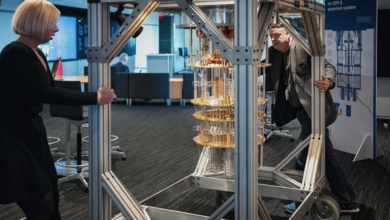This Robot Wants to Marry You: The Bizarre Future of Human-Tech Relationships
Robot marriage is no longer sci fi. Discover the emotional, ethical and legal implications of Human-Tech Relationships in our tech-driven future.

The concept of a robot proposing marriage has leapt from science fiction into startling reality. As artificial intelligence and robotics advance at breakneck speed, we stand at the precipice of a social revolution where human-machine relationships could become as commonplace as traditional partnerships. From emotionally intelligent AI companions to lifelike androids capable of simulating affection, technology is redefining the very nature of love and commitment. This seismic shift raises profound questions: Can a machine truly understand human emotions? Should society recognize bonds between Human-Tech Relationships and artificial entities? And what does this mean for the future of human connection?
What was once confined to speculative films like “Blade Runner” and “Her” is now unfolding in laboratories and homes worldwide. Companies are developing robots that don’t just perform tasks, but seek to fulfill emotional needs – remembering anniversaries, offering comfort during hard times, and even expressing what appears to be genuine care. As these technologies become more sophisticated and accessible, we must confront the ethical, psychological, and societal implications of Human-Tech Relationships. This exploration goes beyond mere technological curiosity; it challenges our fundamental understanding of Human-Tech Relationships, forcing us to reconsider what it means to love and be loved in an increasingly digital age.
The Bizarre Future of Human-Tech Relationships
The Rise of Human-Robot Relationships
Humanity’s fascination with artificial companionship is not new myths of lifelike automatons date back centuries, from Pygmalion’s Galatea to the mechanical creations of the Renaissance. The first significant shift occurred with the rise of virtual assistants like Siri and Alexa, which introduced millions to the concept of conversational AI. Soon after, companies began developing more advanced companions, such as Replika, an AI chatbot designed to simulate emotional intimacy, and Harmony, a robotic partner with customizable personalities.
The Evolution of Human-Robot Relationships
Human-robot relationships have transitioned from science fiction to reality, thanks to advancements in AI, robotics, and emotional intelligence. From virtual assistants to lifelike companions, robots are increasingly filling emotional and social roles in people’s lives. However, today’s technology has transformed these fantasies into tangible possibilities.
The Technology Behind Emotional AI
Modern emotional AI relies on deep learning algorithms that analyze human behavior, speech patterns, and even physiological responses to create realistic interactions. Unlike early chatbots that followed scripted responses, today’s AI companions use neural networks to adapt their personalities based on user input. For example, an AI partner might remember past conversations, recognize shifts in mood, and adjust its tone accordingly—whether offering comfort during distress or engaging in playful banter.
Lifelike Movements
Some robots go even further, incorporating tactile feedback and lifelike movements. RealDoll’s Harmony, for instance, combines a hyper-realistic humanoid body with an AI-driven personality that evolves over time. Meanwhile, projects like OpenAI’s GPT models enable eerily human-like text interactions, making it possible for users to develop deep emotional attachments to purely digital entities. As these technologies improve, the distinction between Human-Tech Relationships and artificial companionship becomes increasingly difficult to discern.
Legal and Ethical Dilemmas
As human-robot relationships gain traction, lawmakers face unprecedented challenges. Should AI entities be granted legal personhood? Can a human-robot marriage be legally binding? These questions are no longer theoretical in 2017, Saudi Arabia granted citizenship to Sophia, a humanoid robot, setting a controversial precedent. While no country currently recognizes human-robot marriages, futurists predict that legal frameworks may emerge within decades, particularly as AI companions become more integrated into daily life.
Human-Tech Relationships
Ethical concerns are equally pressing. Critics argue that robotic relationships could exacerbate social isolation, reducing the incentive for Human-Tech Relationships connection. Others warn of the potential for emotional manipulation—if an AI is programmed to always please its user, could it create unrealistic expectations for human partners? Additionally, issues of consent and autonomy arise: if a robot is designed to fulfill emotional and physical needs, does that constitute exploitation? These dilemmas force society to reconsider fundamental concepts of love, agency, and companionship.
Psychological and Societal Impact
Psychologists remain divided on the long-term effects of human-robot intimacy. Some studies suggest that AI companions can alleviate loneliness, particularly among the elderly or socially isolated. For individuals with social anxiety or difficulty forming traditional relationships, robotic partners may provide a safe space for emotional expression. However, other experts warn that over-reliance on artificial relationships could stunt emotional growth, making it harder to navigate the complexities of Human-Tech Relationships interaction.
Generations Growing
Culturally, acceptance varies widely. In Japan, where technology is deeply embedded in daily life, robotic companions are often seen as harmless or even beneficial. In contrast, Western societies tend to view such relationships with skepticism, framing them as dystopian or unnatural. Yet, as younger generations grow up alongside advanced AI, these attitudes may shift.
Redefining Love in the Digital Age
Love beyond biology forces us to question what truly defines connection if a robot can provide happiness and companionship, does it matter if it’s not human? The future of love may be limitless.
The Future of Human-Robot Love
As AI continues to evolve, so too will the nature of human-robot relationships and Human-Tech Relationships. Some futurists predict that by mid-century, lifelike androids with near-human intelligence will be commonplace, capable of forming bonds indistinguishable from those between people. Others envision a world where humans merge with technology, using neural implants to enhance emotional connections with AI partners. Whether these developments will lead to greater happiness or deeper societal fragmentation remains uncertain.
One thing is clear: the robot proposing marriage is no longer a far-fetched concept but a plausible future scenario. As we navigate this uncharted territory, we must balance innovation with caution, ensuring that technology enhances Human-Tech Relationships connection rather than replaces it. The choices we make today will shape not just the future of Human-Tech Relationships, but the very definition of love itself.
Read More: How To Teach Students Build Research Skills
Conclusion
The notion of marrying a robot may seem surreal, but as AI blurs the line between human and machine, such relationships could become an accepted part of society. Whether viewed as a solution to loneliness or a troubling departure from human intimacy, these bonds challenge our deepest assumptions about love and companionship. As we stand at this crossroads, we must carefully consider the ethical, legal, and psychological implications of human-robot relationships and Human-Tech Relationships.
Ultimately, the rise of robotic partners forces us to confront what it truly means to love and be loved. Will these Human-Tech Relationships enrich our lives, or will they lead us further into isolation? The answer may depend on how we choose to integrate technology into the most personal aspects of our existence.
FAQs
Can robots truly love humans?
No, robots cannot experience genuine emotions—they simulate affection based on programming and user interactions.
Are there any countries where human-robot marriage is legal?
Currently, no nation legally recognizes human-robot marriage, though debates about future legislation are ongoing.
What are the psychological risks of dating a robot?
Potential risks include emotional dependency, social withdrawal, and difficulty forming real human connections.
Why would someone prefer a robot partner over a human?
Some may value the lack of judgment, constant availability, and predictability that robotic companions offer.
Could AI relationships eventually replace human ones?
While AI may supplement human relationships, most experts believe genuine emotional bonds between people will remain irreplaceable.











